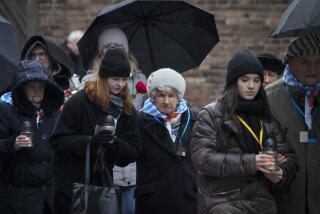The East Is Not Red: For Europe, a New May Day
- Share via
BUDAPEST, Hungary — Flower-festooned Maypoles have sprouted in the wake of Communist Party propaganda posters as East Europeans have traded in hollow testimonials to labor for traditional May Day celebrations of new life after the long, barren winter.
It is a change heavy with symbolism for those recently rid of an ideology that never took root.
Although May Day most recently has been identified with socialism, it began 100 years ago--decades before Soviet domination of Eastern Europe--as a holiday honoring workers around the world and pressing for humane reforms such as an eight-hour workday.
Today, East Europeans have swept aside even its noble aims for the worker, opting for picnics instead of parades and poetry in place of politics.
For Hungarians, Czechoslovaks, Poles and East Germans, May Day has recovered its original innocence as a simple day off to welcome spring.
“The majority of people are fed up with empty, meaningless parades. They don’t want to march and go to rallies; they want to relax and celebrate in their own way,” explained Attila Balint, spokesman for Hungary’s national Trade Union Assn.
Breaking with political traditions of the past 45 years, Hungarians will celebrate their May Day labor centennial in much the same way Americans observe the first Monday in September--as far from life’s worries as possible.
Floral garlands sway from lampposts, and folk bands are making plans to congregate at a park in the Buda Hills, where dancing around the Maypole began centuries before the followers of Karl Marx got their hands on the holiday.
May Day was a time for rejoicing over the season of growth and renewal until 1889, when the Second Socialist International, meeting in Paris, designated May 1 as a day for labor marches and demonstrations. Most Central European nations followed suit a year later, and the folk rituals shared the stage with leftist politics.
Hungary’s official trade union group retains its ties with the Socialist Party, but workers this year have rejected any involvement of politicians in their holiday, Balint said.
In an effort to foster goodwill toward its role as champion of the worker, the trade federation plans to offer free beer at a garden tent in Pest, near the route where the Communist elite used to review the procession of slogan-touting marchers.
As a political holiday in Hungary, the First of May has gone the way of April 4, which until this year celebrated the arrival of Soviet troops to liberate Hungary from World War II fascism. Instead, the nation has adopted Oct. 23 as a national holiday, observing both the outbreak of the 1956 Hungarian uprising against communism and last year’s founding of an independent Hungarian Republic. The nation also plans to restore Aug. 20 as St. Stephen’s Day, after four decades of celebrating the socialist constitution instead of Hungary’s patron saint.
A similar turn away from socialist occasions has occurred in neighboring Czechoslovakia, where young people in Prague plan to gather on May Day at the statue of 19th-Century poet Karel Hynek Macha.
Macha’s ode to spring hailing “the First of May, a time for love” drew sweethearts to his memorial for recitation of sonnets before socialist occupiers sent in police to shoo away such frivolity.
Celebrations in Czech and Slovak lands will have a decidely folkish focus, with dancing, singing and grilled sausages replacing long-winded speeches hailing devotion to labor.
In Poland, where religious traditions withstood the strains of socialist suppression, May Day draws the faithful to church for prayers to St. Joseph, the patron saint of work. Bombastic politicking has even been abandoned by the surviving Communists.
May Day in Poland’s past was a time for courtship rituals and farming taboos, with the planting of potatoes and the setting of hens to lay eggs forbidden in fear of a tainted harvest. Poles began their rituals on the festival’s eve by lighting bonfires on hilltops to chase away evil spirits.
Legend had it that the Continent’s witches gathered at Brocken Peak in Germany’s Harz Mountains to cast spells on industrious farmers.
The superstitious point out that May Day Eve traditions were overlooked by war-weary Europeans in the last days before vanquished Germans surrendered to Soviet troops in 1945, leaving their lands vulnerable to a political plague that endured 40 years.
More to Read
Sign up for Essential California
The most important California stories and recommendations in your inbox every morning.
You may occasionally receive promotional content from the Los Angeles Times.











